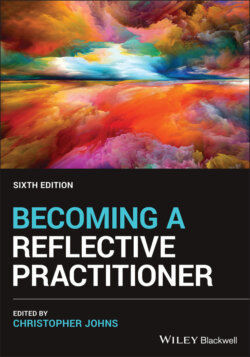Читать книгу Becoming a Reflective Practitioner - Группа авторов - Страница 75
Why Did I Respond as I Did?
ОглавлениеHaving explored what might be significant, the practitioner scrutinises their response(s) in relation to what they were trying to achieve. This naturally raises the question, ‘what was I trying to achieve?’ In response, the practitioner reflects on their clinical judgement and rationale for responding as they did. This may not be easy because many decisions are made reactively or intuitively as if processing information takes place below the mind radar.
The practitioner can review their response through four movements; assessment, judgement, response and evaluation (Table 4.2). Asking ‘How did I assess this situation?’ invites the practitioner to reflect on the way they perceived the situation and the tools they use to facilitate this. ‘Did they listen attentively enough to the patient’s story?’ Krishnamurti’s words are challenging (1996, p. 178/179):
Very few of us listen to what is being said, we always translate or interpret it according to a particular point of view. We have formulations, opinions, judgments, beliefs through which we listen, so we are never actually listening at all; we are only listening in terms of our own prejudices, conclusions or experiences. We are always interpreting what we hear, and obviously that does not bring about understanding. Whatever we listen to is always apprehended through the screen of this conditioning; therefore we can never approach any problem with a fresh mind… where the mind’s conditioning is imposed by society.
Listening and observing is the key to perception. Listening is tuning into the other’s wavelength and flowing with them. This may be challenging when that person’s story is uncertain, for example, with people who are distressed, mentally disturbed or terminally ill, situations where their story may be chaotic.
Based on the assessment, the practitioner can then reflect whether their clinical judgement and responses were adequate in light of desirable outcomes.
